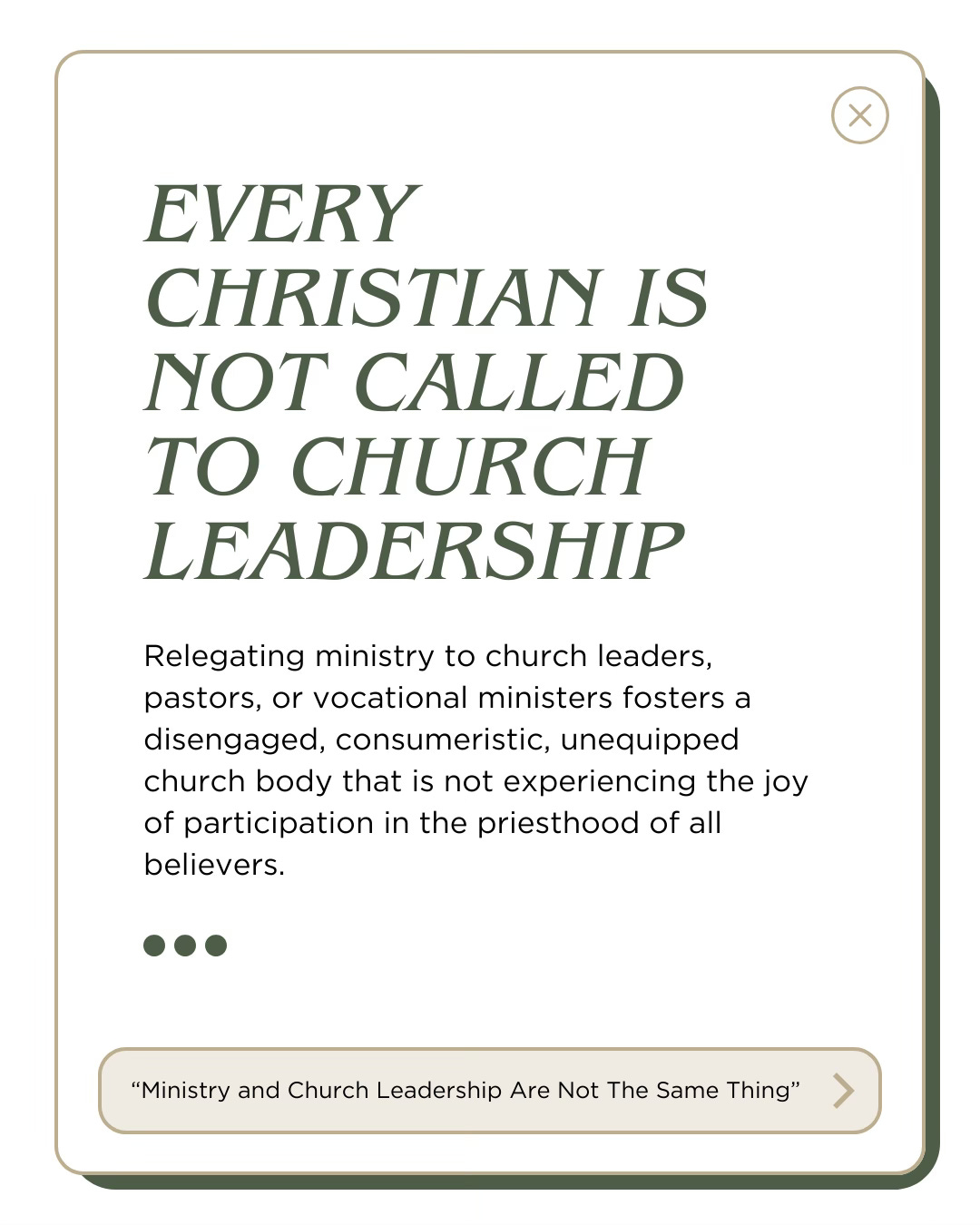Ministry and Church Leadership Are Not The Same Thing
Every Christian is a minister, but every Christian is not a church leader
When we conflate ministry and leadership, we create needless controversy and confusion.
For example, someone might ask, “What do you think about women in ministry?”.
To answer the question, one must clarify the phrase “in ministry”. Let’s be more specific. “Can a woman be an elder?” is a question about the biblical qualifications of church leaders. “Can a woman pray for someone, prophesy, or share the Gospel with their co-worker?” is a question about the normal ministry activities of all Christians. Those are very different questions.
Another question you might hear is, “Is that fallen pastor disqualified from ministry?”
Again, clarity is needed. Are they asking if a fallen pastor can be restored to membership in a local church where they worship, serve others with their spiritual gifts, and share the Gospel with their coworkers in the marketplace? Or are we asking if the fallen pastor can be in a church leadership role again? Those are very different questions.
Doing ministry and being a leader in the Church are not the same thing. Let me explain.
Every Christian Is Called To Ministry
Every believer is a minister. We are all a part of the royal priesthood in Christ (2 Peter 2:5-9). We minister to the Lord with worship, praise, and prayer. We minister to other believers by serving, discipling, giving money, encouraging, praying for each other, and using our spiritual gifts. We minister to the world around us by working hard at our vocation, sharing the Gospel, feeding the poor, and doing good deeds.
Every believer is a priest who is called to minister to God (Acts 13:2) with “spiritual sacrifices (2 Peter 2:5). We are to offer our bodies as living sacrifices (Romans 12:1) and the sacrifices of our praise (Hebrews 13:15) as acts of worship to the Lord.
“You yourselves like living stones are being built up as a spiritual house, to be a holy priesthood, to offer spiritual sacrifices acceptable to God through Jesus Christ.” I Peter 2:5
From the overflow of our relationship with God, we are instructed to minister to our brothers and sisters in the body of Christ. Around fifty times in the New Testament, Christians are taught to feel, do or say something to “one another”. We are told to forgive, encourage, serve, bear with, share, honor, submit to, welcome, instruct, greet and care for another. These administrations are encompassed in Jesus’ commandment to His disciples to love one another (John 13:34-35). Loving other brothers and sisters in Christ is an important part of every disciple’s ministry. The Holy Spirit empowers us to love another in supernatural ways. The apostle Paul calls these empowerments spiritual gifts (I Corinthians 12-14). We should desire these spiritual gifts (I Corinthians 14:1) and use them when we gather together as the church (I Corinthians 14:26) to demonstrate God’s love and power to each other.
“A new commandment I give to you, that you love one another: just as I have loved you, you also are to love one another. By this all people will know that you are my disciples, if you have love for one another.” John 13:34-35
Part of the ministry calling of every believer is to demonstrate the Gospel with good deeds to those outside of the Church as well. Jesus taught us to be “salt and light” in the world who do “good works” that honor our Father in heaven (Matthew 5:13-16). He said to love and care for our neighbors, even those different from us (Luke 10:27-37). Peter tells us to be ready to share the Gospel — to explain the hope we have as Christians (I Peter 3:15). The apostle Paul says we have all been given the “ministry of reconciliation” to help those who are far from Christ be reconciled to Him (2 Corinthians 5:18).
“All this is from God, who through Christ reconciled us to himself and gave us the ministry of reconciliation…” 2 Corinthians 5:18
These expressions of ministry are not just for elders, deacons, apostles, pastors, or church staff. They are for every Christian. You are called to ministry! You do not need a formal permission to do this ministry work. The Holy Spirit is inside of you. If you are in Christ, you have already been commissioned to minister to God, the Church, and the lost with His love and grace.
Every Christian Is Not Called To Church Leadership
All Christians are to be ministers, but only some are to be leaders in the Church. Using the wrong language creates problems. Relegating ministry to church leaders, pastors, or vocational ministers fosters a disengaged, consumeristic, unequipped church body that is not experiencing the joy of participation in the priesthood of all believers.
The other problem with incorrect language is it muddies the waters regarding the sacred responsibility of church leadership. Church leadership is not something to be taken lightly. The biblical leadership roles come with distinct qualifications for entering into those positions and warnings about the failure to steward those roles properly.
James said that teachers will be judged more harshly than other believers.
“Not many of you should become teachers, my brothers, for you know that we who teach will be judged with greater strictness.” James 3:1
Teams of “elders” are the primary leaders of local churches in the New Testament. Elders are the leaders who look after the flock, teach the Bible, discipline sin, resolve disputes and steward the church finances. The apostle Paul gives specific character qualifications for those appointed to the office of elder (Titus 1:5-9, I Timothy 3:2-7). He calls the role a “noble task” or “fine work” (I Timothy 3:1).
Deacons are the leaders who serve the elders and the congregation in the practical operations of the church. Paul also gives Timothy specific qualifications for those he was appointing to the office of deacon (1 Timothy 3:8-13).
Apostles, prophets, evangelists, pastors, and teachers are the leaders who equip the saints for the “work of the ministry”.
“And he gave the apostles, the prophets, the evangelists, the shepherds and teachers, to equip the saints for the work of ministry…” Ephesians 4:11-12
Every Christian does the “work of the ministry”, but only some are graced to equip the Church to do that work. To use a sports metaphor, Church leaders shouldn’t be playing the game while the congregation sits on the sidelines watching the action. Church leaders should be coaching the players to play the game. That is true Christian leadership.
Only some believers have the grace to be an apostle, prophet, evangelist, pastor, or teacher. If you have that grace, use it to equip others for ministry. If you don’t have that grace, then get in the game!
Find Your Part To Play
God does not choose favorites in the Church. Leaders are not more spiritual than the rest of the Church. God doesn’t love leaders the most. They just have a unique part to play in God’s kingdom. He has a different role for each believer in the body of Christ, and some have a leadership role.
Be grateful for the part God has given you to play in His kingdom. And if that includes leadership, be sober about that responsibility. If not, be humble enough to admit you aren’t called to leadership or don’t meet the biblical qualifications for a particular role. That’s ok. You may not be called or qualified to be a leader in the Church, but can still be equipped to do the work of the ministry. Because every believer isn’t a leader, but every believer is a minister.








Great differentiation between "minister" and "leader." It's challenging to me as I often use "leadership" in the broadest sense of the word (maybe more cultural than biblical). Some of my use it intentionally to reach our culture and where they are at. "Minister" is a misunderstood and hard-to-digest word for people outside and (unfortunately) inside the church. Thanks for your work on this.